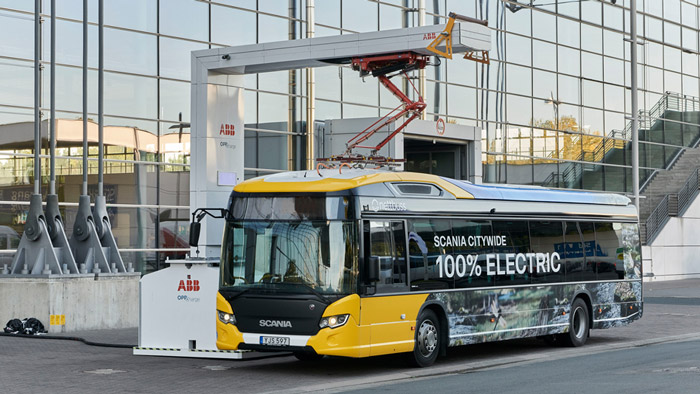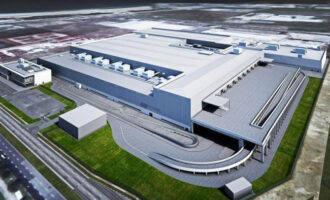
TRATON GROUP aims to become leading provider of battery-powered commercial vehicles
The TRATON brands MAN, Scania, and Volkswagen Caminhões e Ônibus said they are committed to an electromobility offensive aimed at creating a complementing solution to the combustion engine.
“Our goal is to become the leading provider of e-trucks and e-buses,” said Andreas Renschler, member of the Board of Management of Volkswagen AG and CEO of TRATON SE at the Group’s Innovation Day in Södertälje, Sweden.
This is why an increasing share of the group’s R&D budget is flowing into this technology and common brand platforms.
“By 2025, we plan to have spent a total of more than €1 billion in electromobility,” Renschler said.
However, increased market penetration by electromobility is highly dependent on charging infrastructure and the costs of purchasing and operating a battery-powered vehicle — the decisive factor for forwarding companies.
“But our customers’ interest in e-mobility is clearly growing,” said Renschler. “In the mid-term, we expect that the total cost of ownership (TCO) of battery-powered commercial trucks used in distribution services and city buses will be comparable with vehicles powered by fossil fuels.”
The reason: Battery cells will become less expensive, and their service life will grow, the group said.
“If all necessary prerequisites are in place at the right time, I expect for our group, that in the next 10 to 15 years, every third of our trucks and buses can have an alternative drivetrain, most of them fully electric.”
He added, however, that “one of the prerequisites is that the infrastructure for alternative fuels and electricity must be fully available to guarantee seamless operation!”
One big strength of the TRATON GROUP is its ability to spread development costs across the three brands.
“In the group, we are developing a common modular electric powertrain toolkit, that will be used in 2020 in the first serial produced all-electric city buses made by Scania and MAN,” said Christian Levin, chief operating officer and head of R&D at TRATON SE.
“It can be individually modified depending on the brand and area of use. As a result, a maximum number of individual solutions can be produced with a minimum number of components and costs.”
For the first time, TRATON has also introduced a cross-brand development budget for electromobility and brought together teams from all over the group. They are working on the next generation of e-drive systems, software for battery management, and the compatible frame structure. TRATON’s brands already hold more than 1,000 electro mobility patents — and, thus, some 25% more than in 2018.
The activities of the brands in the TRATON GROUP are aligned: Scania is the innovation leader for sustainable transport solutions, working on many different non-fossil alternatives. As a full-range business partner, MAN pursues a broader strategy ranging from light to heavy commercial vehicles. And VWCO’s approach is to offer tailor-made solutions with the best value for money ratio, especially for markets in Latin America and Africa.
Volkswagen Caminhões e Ônibus (VWCO) has signed the world’s largest purchase intention agreement for e-trucks — 1,600 trucks have been ordered by the Brazilian beer and beverage producer Ambev. Deliveries are scheduled to begin in 2020 — and it was available for test drives for the first time in Europe at the Innovation Day. In order to speed up the introduction of e-vehicles in Brazil, VWCO has just announced the formation of an e-Consortium at its Brazilian R&D and production complex. This is the first time that a vehicle manufacturer has established a complete support structure for its electric trucks, from manufacturing to setting up the charging infrastructure and managing the life cycle of the battery pack, leveraging the commitment of the company’s fully integrated supply chain.
Later in 2019, Scania plans to put a bus in operation which will electrically and autonomously transport passengers for Nobina in the Stockholm metropolitan area. Together with Asko, Norway’s largest food wholesaler, Scania is testing fuel-cell trucks with an electric powertrain in which the electrical energy is converted from hydrogen gas from renewable resources in fuel cells on board the vehicles. Later on, Asko will be testing a Scania battery-electric truck.
E-trucks made by MAN with a total weight of 26 tons are currently being tested by customers in Austria; an extended production of the eTGM for further customer tests is scheduled to start this year. And sales of the new electric MAN van eTGE have taken off since it was introduced into the market: More than 150 of them have been sold in the past 12 months.
In addition to highly efficient diesel drive systems, alternative drives and fuels like biofuels, ethanol or gas technologies, such as LNG and CNG as well as hybrid and plug-in hybrid solutions, are playing a major role in efforts to reduce CO2 emissions.
The three brands have a long tradition and excellent market positions in the area of alternative drives, with MAN, for instance, as the leading supplier for gas-powered city buses in Europe. Today, Scania has the broadest range of alternative fuel-enabled vehicles on the market, ranging from bioethanol trucks and buses to vehicles using liquefied biogas. However, TRATON projects that demand for electric vehicles will continue to rise over medium and long term because electric vehicles will become more affordable and cost less to maintain. In the process, they will be able to take full advantage of their edge in energy costs.
“We have the products for today and tomorrow. We are in the starting blocks,” Renschler said.
The executive urged political leaders to initiate in their respective countries “an incentive program for electric commercial vehicles and a European master plan for charging infrastructures” that would ease customers’ transition to electro mobility.
echo '








